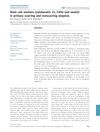 115 citations,
September 2000 in “The Lancet”
115 citations,
September 2000 in “The Lancet” Early hair loss may indicate risk of insulin resistance.
 54 citations,
January 2009 in “British Journal of Dermatology”
54 citations,
January 2009 in “British Journal of Dermatology” Scarring alopecia affects different hair follicle stem cells than nonscarring alopecia, and the infundibular region could be a new treatment target.
 36 citations,
January 2012 in “International Journal of Trichology”
36 citations,
January 2012 in “International Journal of Trichology” Losing eyelashes or eyebrows can be a sign of many different health problems and needs a careful approach to treat effectively.
 32 citations,
April 2014 in “The journal of investigative dermatology/Journal of investigative dermatology”
32 citations,
April 2014 in “The journal of investigative dermatology/Journal of investigative dermatology” Loss of keratin K2 causes skin problems and inflammation.
 28 citations,
January 2018 in “Biochemical Society Transactions”
28 citations,
January 2018 in “Biochemical Society Transactions” Certain fats in the skin help control inflammation and health, and changing these fats through diet or supplements might treat skin inflammation.
 16 citations,
February 2018 in “BMC Genomics”
16 citations,
February 2018 in “BMC Genomics” Certain genetic markers linked to reproductive potential were identified by their impact on a protein's ability to bind to genes.
 8 citations,
September 2018 in “Journal of Cosmetic Dermatology”
8 citations,
September 2018 in “Journal of Cosmetic Dermatology” Lower irisin levels in the blood may indicate more severe acne.
 8 citations,
March 2014 in “American Journal of Pathology”
8 citations,
March 2014 in “American Journal of Pathology” Damaged hair follicles make mice more prone to skin inflammation and skin cancer after UV exposure.
 7 citations,
January 2019 in “Australasian Journal of Dermatology”
7 citations,
January 2019 in “Australasian Journal of Dermatology” A genetic marker linked to a type of hair loss was found in most patients studied.
 5 citations,
November 2012 in “The Journal of Urology”
5 citations,
November 2012 in “The Journal of Urology” Early hair loss may indicate future prostate issues.

A high-fat diet caused severe health problems in female macaques but was reversible with a normal diet, while male macaques reacted differently.
 April 2017 in “Journal of Investigative Dermatology”
April 2017 in “Journal of Investigative Dermatology” Cholecystokinin may help reduce skin inflammation in psoriasis.
 144 citations,
September 2012 in “Genes & development”
144 citations,
September 2012 in “Genes & development” Aging causes skin stem cells to work less effectively.
 68 citations,
May 2011 in “European Journal of Dermatology”
68 citations,
May 2011 in “European Journal of Dermatology” Acne is caused by genetics, diet, hormones, and bacteria, with treatments not yet curative.
 28 citations,
August 2011 in “Journal of The American Academy of Dermatology”
28 citations,
August 2011 in “Journal of The American Academy of Dermatology” Early hair loss may indicate prostate issues.
 22 citations,
March 2017 in “Scientific reports”
22 citations,
March 2017 in “Scientific reports” Double-stranded RNA causes inflammation in hair follicle cells, which may help understand and treat alopecia areata.
 21 citations,
July 2016 in “Gynecological Endocrinology”
21 citations,
July 2016 in “Gynecological Endocrinology” Obese and non-obese women with PCOS have higher heart risk markers, especially if they are obese.
 20 citations,
December 2010 in “JEADV. Journal of the European Academy of Dermatology and Venereology/Journal of the European Academy of Dermatology and Venereology”
20 citations,
December 2010 in “JEADV. Journal of the European Academy of Dermatology and Venereology/Journal of the European Academy of Dermatology and Venereology” Decreased CD200 in hair follicles may cause immune issues in some alopecia areata cases.
 6 citations,
December 2010 in “Journal of Cosmetic Dermatology”
6 citations,
December 2010 in “Journal of Cosmetic Dermatology” Apoptosis may contribute to hair loss in androgenetic alopecia.
 January 2018 in “Springer eBooks”
January 2018 in “Springer eBooks” Hidradenitis Suppurativa is likely an autoinflammatory disease, and better understanding its causes could improve treatments.
 55 citations,
April 2010 in “Cancer and Metastasis Reviews”
55 citations,
April 2010 in “Cancer and Metastasis Reviews” TGFβ's manipulation of inflammation and immune cells affects cancer spread, suggesting new treatment strategies and biomarkers.
 29 citations,
March 2010 in “Journal of Endocrinological Investigation”
29 citations,
March 2010 in “Journal of Endocrinological Investigation” Lipocalin-2 levels are higher in women with PCOS and may indicate insulin resistance.
 February 2023 in “Research Square (Research Square)”
February 2023 in “Research Square (Research Square)” Blocking IL-17 can reduce skin inflammation in a mouse model of pityriasis rubra pilaris.
 September 2023 in “Research Square (Research Square)”
September 2023 in “Research Square (Research Square)” Evening primrose oil significantly improves hormone levels and reduces BMI and cholesterol in women with PCOS.
 438 citations,
October 2010 in “Oncogene”
438 citations,
October 2010 in “Oncogene” Keratins help protect cells, aid in cancer diagnosis, and influence cancer behavior and treatment.
 291 citations,
April 2010 in “Gastroenterology”
291 citations,
April 2010 in “Gastroenterology” Certain proteins, Lgr5 and Lgr6, are important markers of adult stem cells and are involved in tissue repair and cancer development.
 17 citations,
June 2012 in “The Anatolian journal of cardiology”
17 citations,
June 2012 in “The Anatolian journal of cardiology” Premature hair graying may be a sign of increased risk for heart disease, indicating biological age is more important than actual age.
 14 citations,
February 2020 in “Stem Cells International”
14 citations,
February 2020 in “Stem Cells International” Umbilical cord cells safely improve healing in long-term nonhealing wounds better than a placebo.
 6 citations,
July 2015 in “Journal of Investigative Dermatology”
6 citations,
July 2015 in “Journal of Investigative Dermatology” Chicken feather gene mutation helps understand human hair disorders.
 October 2024 in “Frontiers in Oncology”
October 2024 in “Frontiers in Oncology” Keratin 18 helps diagnose and predict cancer progression and affects cancer growth and spread.






























